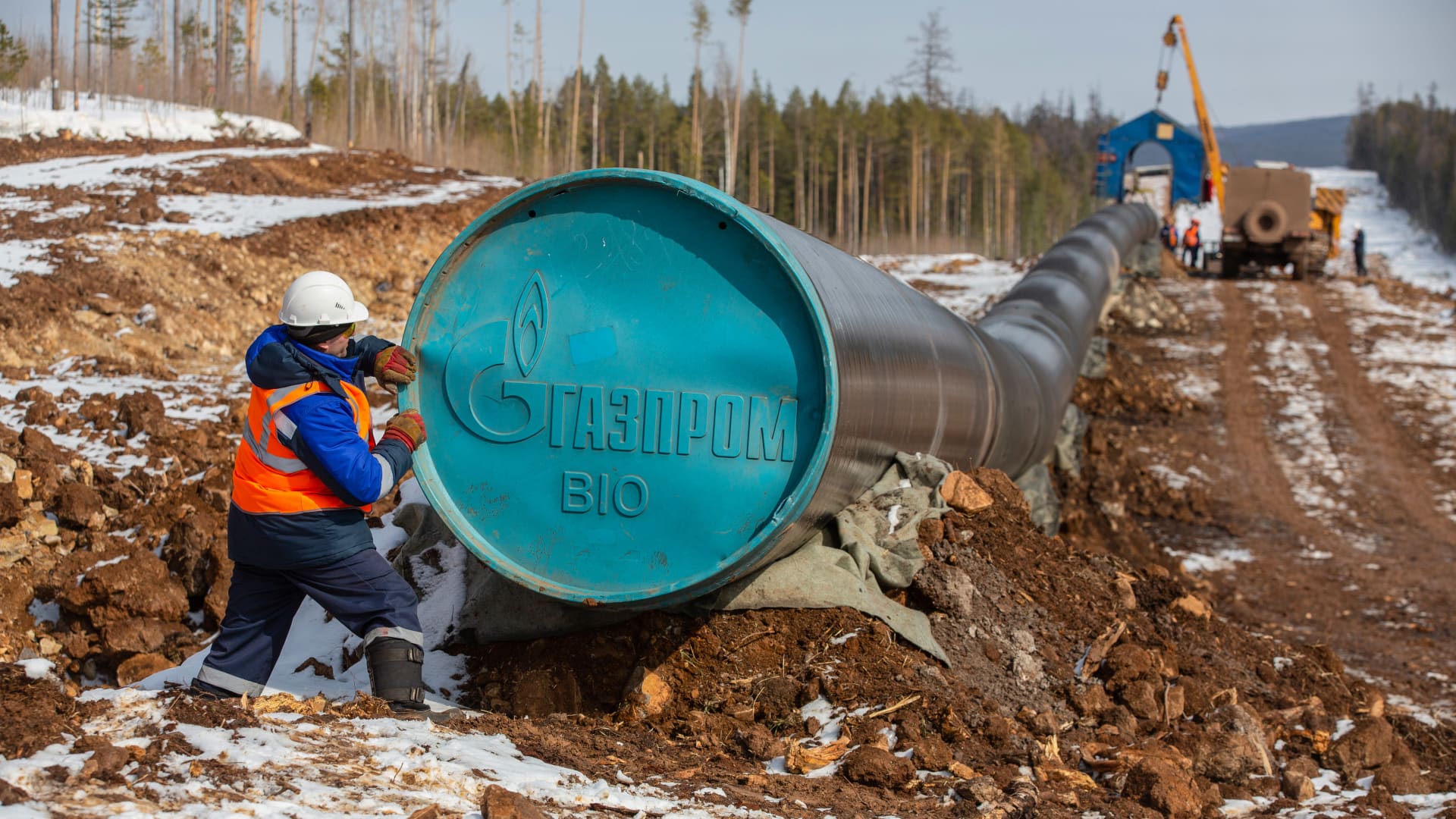
Russia appears to have walked back demands that European companies pay for gas supplies in rubles from Thursday, temporarily alleviating the risk of supply disruptions.
It comes after Russia’s President Vladimir Putin repeatedly demanded that so-called “unfriendly” countries pay for gas in rubles, rather than in euros or dollars, targeting those behind the heavy economic sanctions designed to isolate Russia over its unprovoked onslaught in Ukraine.
Putin had instructed state-controlled gas giant Gazprom, the central bank and the government to outline proposals for how this policy would be implemented by Thursday. The currency switch for gas supplies had been rejected by major G-7 economies.
However, in a call with German Chancellor Olaf Scholz on Wednesday, Putin said European companies could continue paying for gas supplies in euros or dollars.
The money will be paid into Gazprom Bank and transferred in rubles to Russia, German broadcaster Deutsche Well reported.
Scholz did not agree to this procedure in the talks but asked for written information to better understand the proposal, according to the report.
The Kremlin said the currency switch was necessary due to the fact that the foreign exchange reserves of the Bank of Russia had been frozen by EU member states. It was agreed that experts from Russia and Germany would continue to negotiate on this matter, the Russian statement said.
Separately, Kremlin spokesman Dmitry Peskov on Wednesday confirmed that Russia would not be seeking gas payments in rubles immediately, saying instead the switch was likely to be a “gradual process.”
Germany, alongside the G-7, has signaled that gas supply agreements cannot be unilaterally modified and European buyers of Russian gas say the Kremlin is not entitled to redraw long-term contracts.
Most countries currently pay for Russian gas in euros or dollars.
What now?
The gas-for-rubles threat had raised the prospect of a supply cut-off to European countries, with Germany and Austria taking precautionary steps toward gas rationing to avoid a potential halt in deliveries amid the dispute.
However, analysts at political risk consultancy Eurasia Group say it is unlikely Gazprom will violate its existing contracts by refusing to supply gas to customers who refuse to pay in rubles in the short term.
“More likely, Gazprom will instead seek to renegotiate existing contracts — a time-consuming process at the best of times — in the context of periodic reviews which most long-term contracts allow for. Longer-term, Gazprom is likely to insist that new contracts reflect the new policy once they come up for renewal,” analysts at Eurasia Group said in a research note.
“There is a risk that Russia will move more aggressively, which would imply a higher chance of gas supply disruption in the short term,” they added. “But a drawn-out negotiation process is more likely.”
European countries’ dependence on Russian energy exports has been thrust into the spotlight since the Kremlin launched its invasion of Ukraine on Feb. 24, particularly as energy-importing countries continue to top up Putin’s war chest with oil and gas revenue on a daily basis.
Indeed, revenue from Russian oil and gas was seen to be responsible for roughly 43% of the Kremlin’s federal budget between 2011 and 2020, highlighting how fossil fuels play a central role for the Russian government.
The European Union receives roughly 40% of its gas via Russian pipelines and several of which run through Ukraine.
‘Lengthy arbitration’ risk
Anne-Sophie Corbeau, a research scholar at Columbia University’s Center on Global Energy Policy, told CNBC that a failure to resolve the ruble payments stand-off could result in a lengthy arbitration process.
Companies have long-term contracts with Gazprom. If there is a clause within these contracts allowing companies to switch currencies to pay in rubles, Corbeau said this could be one possible outcome. If there is no clause, however, the terms of the contract prevail, most likely in either euros or dollars — and this cannot be changed.
In this latter scenario, Corbeau said Gazprom “would need to ask for a formal renegotiation of the terms of the contract, but I would not expect buyers to agree, and you would end up with a lengthy arbitration.”
The front-month gas price at the Dutch TTF hub, a European benchmark for natural gas trading, traded down over 7% at 111 euros ($123.9) per megawatt-hour on Thursday, according to New York’s Intercontinental Exchange.
The TTF-month ahead index has traded at elevated levels in recent weeks, partly due to persistent geopolitical concerns.
“Should renegotiations start at the insistence of Russia, it is likely that importers will be offered value elsewhere in their deals with Russia in return for the change to ruble payments,” Vinicius Romano, senior analyst at Rystad Energy, said in a research note.
“The challenge to put this in practice is that each buyer may have different conditions, while some may not even be willing to alter contractual terms. This suggests that negotiations might take some time, which means there is still no abrupt deadline for the payment to switch to rubles.”




